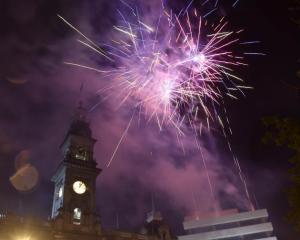The deafening racket of the clicking cicadas in the trees, the endless stretch of the azure sky, the gentle wash of the waves and the glimmer of aquamarine sea, the people of Aotearoa gathered at the Treaty Grounds to mark our most important moment as a nation.
Tomorrow, should anyone need reminding, is Waitangi Day, New Zealand’s national holiday.
It’s always the peak of the Kiwi summer when the signing of Te Tiriti o Waitangi, and the forging of the partnership between Maori and Pakeha, is celebrated — and hotly debated.
Unfortunately this year, the intervention of a much bigger event in the form of the Covid-19 pandemic has scuppered plans for the usual dawn commemorations at Waitangi.
With the threat of the Omicron variant looming over New Zealand, the Treaty Grounds will be closed, and Governor-General Dame Cindy Kiro, Prime Minister Jacinda Ardern and most ministers have wisely chosen to stay away from what is a crowded and often rather chaotic occasion.
Instead, the Waitangi Day service will be shown on television with prerecorded segments featuring Ms Ardern and Dame Cindy, whose recent trip to Waitangi then forced them both into isolation after being on a flight with someone with Covid.
So what can be said about Waitangi Day that hasn’t been said a thousand times before?
Perhaps being stuck in the midst of a global pandemic provides an ideal opportunity to stand back and reflect on the kind of place Aotearoa New Zealand has become and whether we are happy with the way things are going.
Everyone is entitled to their own opinions, of course, but New Zealand appears increasingly divided – by race, by vaccination status, and by wealth, including the ability to own your own home.
One might expect divisions over race would heal with experience and time, given many prejudices are based on ignorance or fear.
However, in our small South Pacific country, we seem to be going the other way.
Maybe it is just easier, and a sign of lazier thinking, to be pessimistic rather than optimistic about things. But while we should be moving into more enlightened times, there is still a great deal of casual racism and anti-Maori prejudice in New Zealand, and it has to be said a chunk of that is generated in the South.
There can be little doubt Maori still overwhelmingly get the short end of the stick when it comes to housing, education and health.
Just this week, a study of 30,000 patients on the Breast Cancer Foundation national register between 2003 and 2019 showed Maori women were 33% more likely to die of breast cancer within 10 years than Pakeha women.
The Covid-19 vaccine rollout provides another example. It is clear that, for sound health reasons, Maori should have been eligible for their first jabs earlier than the Government allowed.
The Three Waters reforms have certainly upset some Pakeha, who see a high-level of iwi participation as tantamount to a Maori “takeover”. Similarly, there are Pakeha who harrumph loudly at the increased use of te reo by broadcasters during the past year or so, resenting what they say is having it forced down their throats.
These people need to listen to themselves and their narrow world views, and take a chill pill.
The same goes for Maori who, using inflammatory language, blame colonisation by Pakeha and the colonisers for all sorts of wrongs and issues that are clearly endemic to both groups.
Waitangi Day has always been a day on which differences have been vocally, sometimes violently, aired.
While a robust discussion should always be welcomed, some of the shenanigans at Waitangi over the years have left a sour taste in the mouth for those involved and those watching on.
Is it possible that the new Matariki public holiday on June 24 might provide a more inclusive celebration without the baggage of Waitangi Day?












